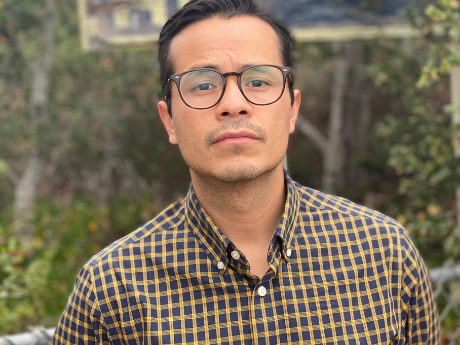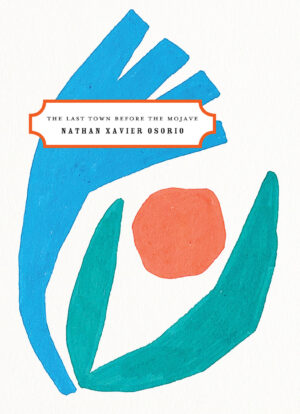In Their Own Words
Nathan Xavier Osorio on “English as a Second Language”

Surrendering to nausea in the felt-lined Tijuana-bound camper
I doubted the integrity of the breast-shaped nuclear reactors
fixed on the Pacific shore, cherry-pink nipples upright and beaconing
at a waltz tempo to the deepwater roughnecks swaying in their hemp
hammocks below a network of oil lines spouting flames into the oceanic
infinitude dyed dead-eagle-god red and I shrinking in importance
like in my collegiate days when I nodded submissively to a professor
who assured me my failure was because English was my second language
which is true if second to the cosmic mutterings of black holes
which is true nights I bellow desert monsoons into extinction
which is true when my hands are held up bearing the Atlantean
burden of brownness but which is most true here, surrendering
to nausea in the felt-lined Tijuana-bound camper
piloted by my dark-skinned father whom I’ve only ever understood in dialect
amalgamated from epazote and McDonald’s fries gathered
between the San Gabriel Mountains and Popocatepetl
who continues his delicate lament of ash even when exposed
by the melting glaciers that once kept his mourning summit numb
I whisper to the Exxon™ Mobil gas station that I too can love
enough to become a volcano and reach out so that my palm
skates atop a gust of sea breeze and the invisible exhaust
of topless convertibles, blond hair pouring upward
from their front seats and strangling the open air uninhibited
and drunken with the riches of the west, the tall straw rippling
on the hillside in unison, the mega-outlet with its 24-hour security
desk illuminating the alleyways of the bad neighborhood
and the hordes of day laborers spilling out into the avenues
climbing atop trucks unsolicited, sharp-eyed and hungry
now I will say it, blessed be the Virgin Mary
that I’ve kept this close to the southern frontier
this close to the police beat and the ticking tear-gas canisters,
this close to the unidentifiable pots of spices roiling in the night markets
I reach to Gloria Anzaldúa and read Borderlands
till I lose sight of the swallows’ nests that stipple the cliffsides
and drift onto the Harbor Freeway where in March 2006
the children of the frontier were in multitudes curdling traffic
a thousand strong as I sat sugar-buzzed and unobstructive in homeroom
and now my head rolls forward and I startle awake
the idle nuclear reactors pulsing longingly in the rearview mirror
the oil-rig plume billowing tenderly in response, our roughnecks’
night sweat cooled by the prospect of tomorrow’s new depths
it baited as progress as self-preservation that will not include me
or my pilot or maybe even you, but whoever has and still sits
in the enormous leather chair.
Reprinted from The Last Town Before The Mojave (Poetry Society of America, 2022). All rights reserved.
On “English as a Second Language”
Growing up, my father would drive us down to Tijuana and Puerto Nuevo in Baja California, Mexico for a weekend getaway and cheap prescription medicine. The four-hour drive on the 5 freeway takes you through the length of Los Angeles, Orange County, and San Diego before depositing you at the San Ysidro Port of Entry, the U.S.’s busiest land border crossing. The drive, which I try to capture in my poem as a mutation of the classic American Road Trip, is a remarkable display of U.S. imperialism and racial inequity.
This stretch of the 5 freeway takes you through influential media capitals, neighborhoods of Latin American diasporas, and along the now-decommissioned San Onofre Nuclear Generating Station, which embraces the Pacific coastline as a monument to failed American ingenuity. This is all before arriving to San Diego, the birthplace of colonial California, home to one of the world’s largest imperial naval fleets, and the first American stop for generations of migrants displaced by U.S. interference—including both of my parents. This highway and its eclectic landscapes are embedded, like my poem, with memories of my personal coming-of-age and familial history, but also the long struggle for the freedom of movement.
I’m drawn to using the lyric to better understand the material detritus of late-stage capitalism and its very real human cost. I originally wrote the poem in response to a prompt from the poet Timothy Donnelly, based on Ross Gay’s “Ode to Sleeping in my clothes.” Although no longer an ode in the traditional sense, my poem examines the colossus infrastructures that sustain American enterprise by any means necessary—and the estrangement experienced by those who are exploited in its service. I hope my poem does this by enacting a parallel formal architecture on the page: a rhythmic system built on maximalist images, an insurgent ode to a more critical—and hopefully liberated—relationship to the English Langauge.



